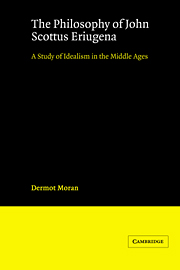Book contents
- Frontmatter
- Contents
- Preface
- Acknowledgments
- Chronology
- List of abbreviations
- 1 European intellectual culture in the ninth century
- 2 The predestination debate
- 3 Eriugena's life and early writings
- 4 The Greek awakening
- 5 The Periphyseon
- 6 Eriugena as philosopher
- 7 Eriugena's sources
- 8 Dialectic, philosophy, and the life of the mind
- 9 The meaning of human nature
- 10 Self-knowledge and self-definition: the nature of human knowing
- 11 The meaning of non-being
- 12 The meaning of nature
- 13 Eriugena's influence on later mediaeval philosophy
- 14 Conclusion
- Bibliography
- Index nominum
- Index rerum
2 - The predestination debate
Published online by Cambridge University Press: 05 June 2012
- Frontmatter
- Contents
- Preface
- Acknowledgments
- Chronology
- List of abbreviations
- 1 European intellectual culture in the ninth century
- 2 The predestination debate
- 3 Eriugena's life and early writings
- 4 The Greek awakening
- 5 The Periphyseon
- 6 Eriugena as philosopher
- 7 Eriugena's sources
- 8 Dialectic, philosophy, and the life of the mind
- 9 The meaning of human nature
- 10 Self-knowledge and self-definition: the nature of human knowing
- 11 The meaning of non-being
- 12 The meaning of nature
- 13 Eriugena's influence on later mediaeval philosophy
- 14 Conclusion
- Bibliography
- Index nominum
- Index rerum
Summary
At the time of the beginning of the predestination controversy, in the 840s, Eriugena was a teacher of the liberal arts at Charles's court. We can infer this from a letter written around 851–2 by Bishop Pardulus of Laon to the church at Lyon. Pardulus mentions Eriugena in the letter as scotum ilium qui est in palatio regis, Joannem nomine, and says that John was requested to write a work clarifying the problem after the views of a number of people (including Lupus of Ferrières, Hrabanus Maurus, Prudentius, Amalarius, and Ratramnus) regarding Gottschalk's tract had been solicited. In fact, Ratramnus was a friend of Gottschalk's, as was Lupus. So it is not surprising that their answers were unsatisfactory and that Pardulus and Hincmar searched elsewhere for a champion to oppose Gottschalk. This letter represents the first recorded mention of Eriugena.
Gottschalk (805–68) was a Saxon monk of noble birth and rebellious spirit who had studied with the brilliant but eclectic Hrabanus Maurus at the monastery of Fulda into which he had been given as an oblate by his father, before managing to be transferred to Orbais and later to Corbie. Gottschalk left the monastery without permission, and his extensive travels included a visit to Rome, where he taught his view of predestination at the court of Count Eberhard of Friuli (who was connected by marriage with Charles the Bald) in 845–6. He returned to a fierce controversy in France.
- Type
- Chapter
- Information
- The Philosophy of John Scottus EriugenaA Study of Idealism in the Middle Ages, pp. 27 - 34Publisher: Cambridge University PressPrint publication year: 1989
- 1
- Cited by



